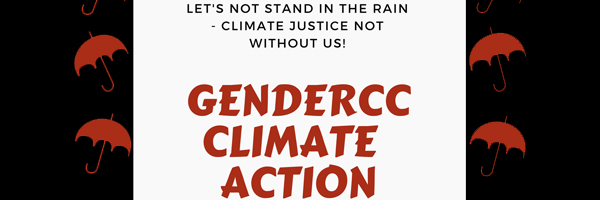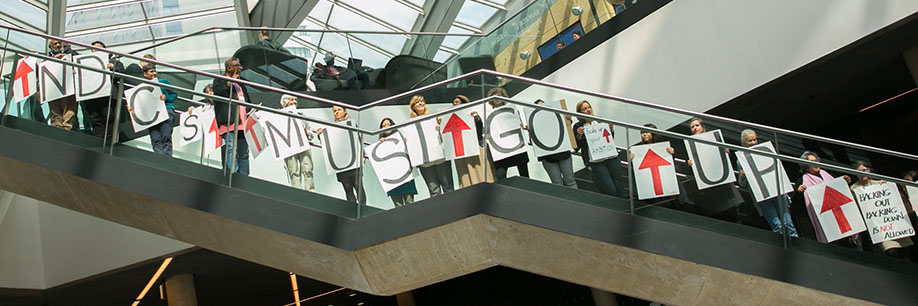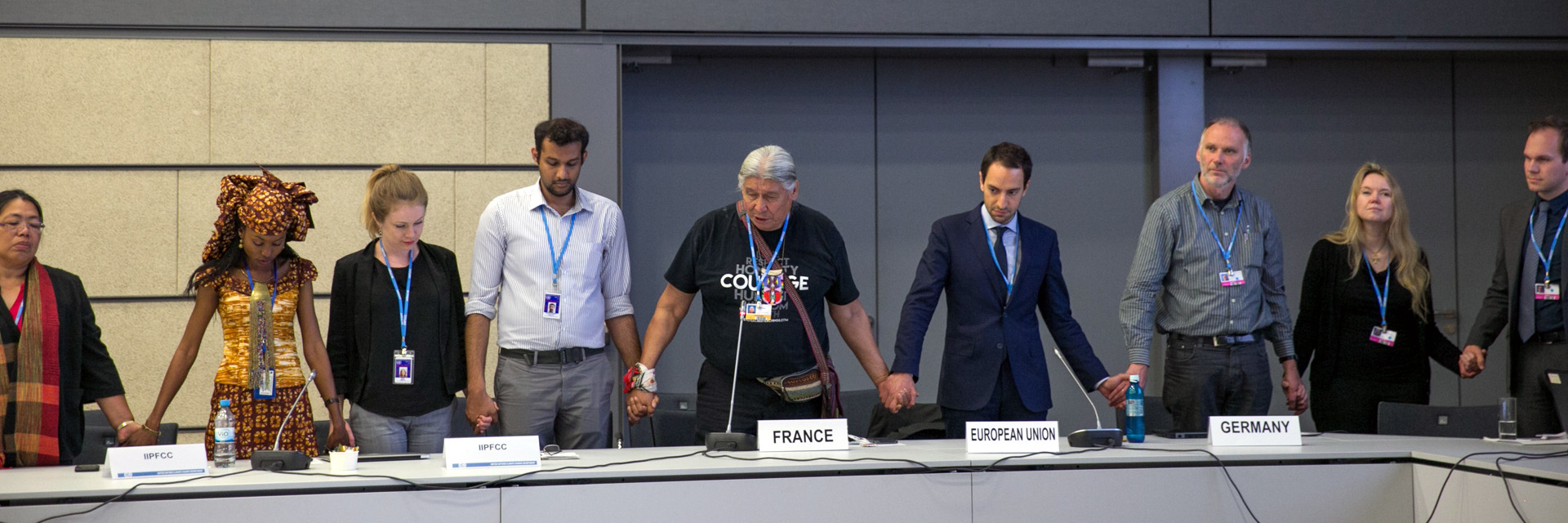Gender activities leading up to COP23 in Bonn
Climate action. Not without us! GenderCC flashmob prior to COP23

Ten days prior to COP23 GenderCC held a successful flashmob action in Berlin, Germany. The action highlighted that gender equality is crucial for climate justice. It also drew attention to the gender items on the agenda of the upcoming climate change negotations! At COP23, we expect Parties to reach a decision that will mark a milestone in the efforts to integrate gender into international climate policy: the first Gender Action Plan under the UNFCCC.
3rd edition of the Gender-Just Climate Solutions Awards!
The Gender-Just Climate Solution Awards aim to showcase real solutions for a more just, equal and healthy planet and is initiated by the Women and Gender Constituency (WGC) under the UNFCCC. The three winning award recipients will receive € 2000, travel support to attend COP23 and mentorship opportunities – while runners-up will be showcased in a publication, on an online platform and at the awards ceremony.
The application period is closed and currently the jury, consisting of WGC member organisations, is reviewing all submitted projects for which projects meet all criteria best and can convince with promising gender-just project designs.
We are looking forward to showcasing these solutions from around the world! The award winners will be announced on Monday November 13, 16:45 to 17:15 in Meeting Room 7 in the Bonn Zone of the COP23 venue. More information
Further gender-just climate solutions of the members of the Women and Gender Constituency are showcaste in an exhibition in the Frauenmuseum in Bonn from November 4-16. The exhibition is open to a broad public and no registration is required. More information

SB46 Climate Change Conference, May 2017 in Bonn
The team of the International Secretariat and several of GenderCC's members were represented at the SB46 negotiations from May 8-18, 2017 in Bonn, Germany.
A highlight of the SB45 meetings was the in-session workshop to develop possible elements for a Gender Action Plan (GAP) within the UNFCCC. This workshop was the result of an decision adopted by Parties at COP22, which requested the Subsidiary Body for Implementation (SBI) to develop a gender action plan in order to support the implementation of gender-related decisions and mandates under the UNFCCC process.
On the first day, following an official welcome by Patricia Espinosa, the new UNFCCC Executive Secretary, civil society representatives, including Bridget Burns, the Co-Focal point of the Women and Gender Constituency, and grassroots women added inputs and demanded that their voices are heard in this process. On the second day, small groups were formed to address possible priorities and key thematic areas for the GAP, including capacity building, knowledge sharing and communication; gender balance and participation; coherence within the UNFCCC and other UN agencies; gender-responsible implementation and Means of Implementation (MoI), as well as monitoring and reporting.
The outcomes of the workshop were summarised by the UNFCCC Secretariat in an informal summary report.
The organisations of the Women and Gender Constituency had handed in a joint submission summarizing their views on possible elements of the Gender Action Plan as well as their recommendations for the in-session workshop.
All interventions delivered on behalf of the Women and Gender Constituency are available here.
Due to time constraints two interventions could not be delivered in the plenary. You can watch them here.
WEDO prepared an extensive analysis and overview of entry points for gender-responsive climate policy at SB46 which is available here.
Photos of the SB46 sessions by the IISD/ENB Reporting service can be found here.
Inauguration of the Platform for Indigenous Peoples and Local Communities
At this year's climate talks in Bonn, the first gathering of the platform for indigenous peoples and local communities within the UNFCCC took place. The two day multi-stakeholder dialogue on the platform's operationalization turned out to be a fruitful exchange of experiences and views on the relevance of indigenous and traditional knowledge and indigenous peoples' engagement in climate change policy and action. The important role and knowledge of indigenous women as well as the necessity for gender-responsive climate policies processes were emphasised by the participants.
The Platform is envisioned to facilitate knowledge exchange and to increase indigenous peoples' engagement in the UNFCCC process and in climate-related actions, programs and policies overall. The inauguration meeting closed with a prayer spoken in one of Canada's first nation's native language while participants showed their strong commitment for the further work of the platform by holding hands.
Capacity building workshop: Linking gender and climate justice to the UNFCCC process
On May 7, 2017 GenderCC and LIFE e.V. with the support of the Rosa Luxemburg Foundation hosted a capacity building workshop on how to link struggles for gender and climate justice to the UNFCCC process. The workshop took place a day ahead of the forty-sixth Session of the Subsidiary Bodies in Bonn. Gender and climate justice activists from different parts of the world came together in this workshop and developed strategies for linking their work on the ground to the international climate negotiations.
The workshop was conducted as part of GenderCC and LIFE's new project Not without us!


